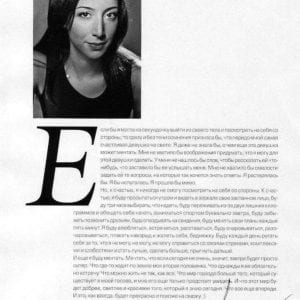The Strange Vogue Ukraine Plagiarism Scandal
When a plagiarism story goes from bad, to worse, to international incident..

Plagiarism scandals in journalism are, unfortunately, becoming more and more common.
An increasingly brutal work schedule combines with the sheer ease of plagiarism online to create a temptation that becomes increasingly difficult to ignore.
But, despite the growth of the problem, a recent story from Ukraine has found a way to stand out from the others. Not only does it involve the editor-in-chief of a major fashion publication, but it’s one of the more unusual and unique plagiarism stories I’ve seen in some time.
Most importantly, it’s a strong cautionary tale about why you shouldn’t buy your work from others and why you should ensure that every word that carries your name was written by you.
While this seems like things that should be pretty obvious to an editor at a major publication, it wasn’t to Olya Sushko and she is paying a price for it.
The Vogue Ukraine Plagiarism Scandal

On October 29, Kiev Fashion Lovers, a channel on Telegram, noticed significant similarities between Olya Sushko’s latest column and a 2006 work editor’s letter written by Shakhri Amirkhanova for the Harper’s Bazaar Russia.
Sushko quickly responded, taking to her personal Facebook to issue an apology for the plagiarism. In it, she said that she was severely overworked and that sometimes she would “freeze” under the stress and pressure of all that was placed upon her.
However, her apology actually made things significantly worse.
That’s because Sushko put the blame on freelance writers that she would sometimes pay to write her columns for her. The freelancer is, predictably enough, not named in the apology and is only identified as someone she has known and trusted for years.
However, many who read her apology took this as a confession to far more widespread plagiarism and unethical practices
Further digging found many other examples of copied and uncited text in Sushko’s work. Sushko’s apology post actually became a hub for such allegations.
The scandal then went from bad to worse as it grew into an international incident.
Vogue Ukraine is published in Russian despite the Ukrainian government pushing for wider usage of the Ukranian language following the annexation of Crimea and other recent tensions with Russia.
In response to the story, the Ukranian foreign minister tweeted that, “Russian MFA (Ministry of Foreign Affairs) used to write texts for propaganda channels, now the channels write texts for the MFA!”
The Russian MFA responded by trying to claim that Shakhri Amirkhanova and Olga Sushko are the same person using different pen names, which they are not.
On October 31st, Conde Nast International announced that it had suspended Sushko pending an internal investigation. That, more than anything, seemed to bring the story to a close, at least until they announce the results of their investigation.
Understanding the Scandal
Setting aside the geopolitical issues that followed the scandal, Sushko’s story is actually fairly straightforward. Her most recent column had significant overlapping text with a 12-year-old article in a different publication and Sushko, in turn, blamed on a freelancer that she paid to write the column.
The problem with this is that, in journalism, hiring a freelance author to write a column for your bylined piece is, in and of itself, plagiarism. It’s akin to hiring an essay mill to write a paper for school.
Simply put, when one presents themselves as a journalist and puts their name on a piece in a publication, the reasonable expectation of the audience is that they wrote it. Hiring a freelancer to write an article for you is misleading that audience.
There are times where ghostwriting is considered acceptable. Examples include political speeches and celebrity autobiographies. In those cases, the audience is aware that the person presenting the work as their own likely didn’t write it,
However, with journalism, the expectation is very different. Journalists are supposed to write the things that carry their byline and hiring a freelancer to write work under your name is a breach of trust. It doesn’t matter how well Sushko knows the freelancer or how good they are, it’s still a lie to the audience.
In short, it’s unlikely that, as editor, Sushko would have tolerated this behavior from a reporter so there is no reason her publisher should tolerate it from her.
But what makes the case fascinating is that the only way that Sushko got caught was because her ghostwriter heavily plagiarized an earlier work. Though this apparently wasn’t the first such plagiarism, it was by far the largest and easiest to spot.
This means that, in addition to using a ghostwriter, Sushko was not adequately checking that writer’s work. Trusting that person enough to write under her name without taking any precautions.
That’s the same mistake countless students make every year when they buy essays off the internet or from a friend. It’s amazing just how many plagiarists are caught not because they hired someone to do the work for them, but because of the sloppy work of the person they hired.
In that regard, Sushko’s story is more befitting a journalism undergraduate student than it is the editor-in-chief of a major publication. But that’s exactly how Sushko’s story unfolded.
Bottom Line
In the end, the story won’t be over until the results of the investigation are in and we know the fate of Sushko. What is clear is that Sushko, by her own admission, not only published multiple articles that contained plagiarism from outside sources, but that the plagiarism was caused by her recruiting a freelance writer to produce content under her byline.
As I said, there are times when ghostwriting is perfectly ethical, but journalism is not one of those times. The reasonable audience expectation of a bylined work is that it is written by said person, not someone they hired.
While I’m sympathetic to the stresses and challenges Sushko faced in her work, it doesn’t justify her actions and her excuse disrespects all of the other editors working under similar conditions but still producing quality, ethical work.
Sushko may not have copied the article that was published, but she is responsible for those words and every bit the plagiarist as if she had. In fact, she is likely even more the plagiarist because of her actions leading to the scandal.
Hopefully, her employers will investigate and take the appropriate action in this case.
Want to Reuse or Republish this Content?
If you want to feature this article in your site, classroom or elsewhere, just let us know! We usually grant permission within 24 hours.
